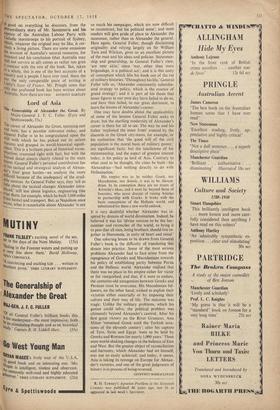Lord of Asia
The Generalship of Alexander the Great. By
Major-General J. F. C. Fuller. (Eyre and Spottiswoode, 35s.)
Iltr career of Alexander the Great, spanning east and west, has a peculiar relevance today; and General Fuller is to be congratulated upon the skill with which he has picked out its salient features and grasped its world-historical signifi- cance. This is a brilliant piece of historical recon- struction, crammed tight with fact, but with the factual detail always clearly related to the main rheme. General Fuller's personal contribution lies in his tactical and strategical analysis of Alexan- der's four great battles—an analysis the more difficult because of the inadequacy of the avail- able sources. As. General Fuller says, they 'tell us little about the tactical changes Alexander intro- 'laced,' still less about logistics, engineering (the river fleets, for example, which he built 3,000 miles from home) and transport. But, as Napoleon once wrote, what is remarkable about Alexander 'is not
so much his campaigns, which are now difficult to reconstruct, but his 'political sense'; and most readers will give pride of place to Alexander the statesman, rather than to Alexander the general. Here again, General Fuller, though disclaiming originality and relying largely on Sir William Tarn and Wilcken, gives us an excellent picture of the man and his ideas and policies. Statesman- ship and generalship, in General Fuller's view, 'are near akin,' since 'war, other than mere brigandage, is a political act'; and it is this unity of conception which lifts his book out of the rut of military histories. 'Throughout his life,' General Fuller tells us, 'Alexander consistently subordin- ated strategy to policy, which is the essence of grand strategy'; and it is part of his thesis that lesser figures in our own day have failed to do so, and have thus failed, to our great detriment, to learn the lessons of Alexander's career.
One may have doubts about the applicability of some of the lessons General Fuller seeks to draw; but the startling modernity of Alexander's career is there for all to see. The way he and his father 'exploited the inner front' created by the discords in the Greek city-states, for example, or his realisation that 'the good will of the civil population is the moral basis of military power,' are significant facts; but the touchstone of his statesmanship, and the aspect of greatest interest today, is his policy as lord of Asia. Contrary to what used to be thought, the cities he built—his Alexandrias—'had nothing directly to do with Hellenisation.'
His empire was to be neither Greek, nor Macedonian, nor Asiatic, it was to be Alexan- drian. In its conception there are no traces of Aristotle's ideas, and it went far beyond those of Isocrates, who never dreamt of raising Asiatics to partnership with Greeks. It broke with the basic conceptions of the Hellenic world, and substituted for them a new world outlook.
It is very doubtful whether Alexander was in- spired by dreams of world domination. Indeed, he believed it was his 'divine mission to be the har- moniser and reconciler of the world, to bring it to pass that all men, being brothers, should live to- gether in Homonoia, in unity of heart and mind.' One sobering lesson to be drawn from General Fuller's book is the difficulty of translating this dream into practice. Some of the most serious problems Alexander had to face arose from the repugnance of Greeks and Macedonians towards his policy of establishing parity between Persia and the Hellenic world. Alexander realised that there was no place in his empire either for victor or for vanquished, and that, if it were to endure, the centuries-old antagonism between Creeks and Persians must be overcome. His Macedonian fol- lowers, on the other hand, wished to exploit their victories either materially or by imposing their culture and their way of life. The outcome was tragic. Unlike the military problems, which his genius could solve, the political problem was ultimately beyond Alexander's control. After his first great victory on the River Granicus, Asia , Minor 'remained Greek until the Turkish inva- sions of the eleventh century'; after his capture of Tyre, Syria and Egypt 'were to be held by Greeks and Romans for nearly 1,000 years.' These were world-shaking changes in the balance of East and West. But the greater object of reconciliation and harmony, which Alexander had set himself, was not so easily achieved; and today, it seems, Asia is taking its revenge on Europe for Alexan- der's victories, and one of the great judgments of history is in process of being reversed.
GEOFFREY BARRACLOUGH


































 Previous page
Previous page